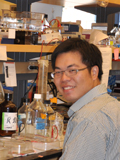As part of a new endeavor to highlight exciting and groundbreaking work done at Sackler, we are now interviewing current students about their science and themselves.
This month’s spotlight is on Wei-sheng Chen (CMDB) who earned his PhD from Sackler last year and whose dissertation work will be published in Nature Communications.
What is your research focused on?
My research focused on the role of galectins, a family of carbohydrate binding proteins, in the ocular diseases. During my Ph.D., I investigated (i) the role of galectins in modulating angiogenesis and lymphangiogenesis, (ii) effect of inhibiting galectin-3 and galectin-8 on corneal and choroidal neovascularization, and (iii) therapeutic opportunities of treating glaucoma.
What are some of your major findings?
My thesis project is to study the role of galectin-8 in modulating the process of lymphangiogenesis. Compared to blood vessels, lymphatic vessels were considered less important, invisible, and thus largely neglected by scientists and clinicians. Only in recent years, subsequent to the identification of lymphatic-specific markers (such as podoplanin), it is becoming increasingly clear that lymphatic vessels do not just serve as passive conduits for interstitial fluid and cells, but is actively involved in the pathogenesis of numerous diseases. In addition, the role of carbohydrate recognition system in the regulation of lymphangiogenesis is poorly understood. For my thesis project, using the avascular cornea as a canvas, I demonstrated that galectin-8 is a key mediator of crosstalk among VEGF-C (vascular endothelial growth factor-C), podoplanin and integrin lymphangiogenic pathways. Also, this is the first report demonstrating that podoplanin is a key player in VEGF-C-induced lymphangiogenesis.
What short- and long-term implications does your research have in your field?
In this study, we demonstrated that in the mouse model of corneal allogeneic transplantation, galectin-8-induced lymphangiogenesis is associated with an increased rate of corneal graft rejection. In addition, in the mouse model of herpes simplex virus keratitis, corneal pathology and lymphangiogenesis are ameliorated in galectin-8 knockout mice. Targeting galectin-8 can be a potential novel therapy for corneal graft rejection and herpes simplex virus keratitis. In addition, these results have broad implications for developing novel therapeutic agents to treat numerous diseases, including, but are not limited to, lymphedema, tumor metastasis, cardiovascular diseases (myocardial infarction, hypercholesterolemia, and hypertension), inflammation and immunity, obesity, glaucoma, dry eye disease, and allergic eye disease.
What initially got you interested in science in general, as well as your current field, and this project(s)?
I began my scientific career as a part-time undergrad student in a cardiovascular lab in National Cheng Kung University, Taiwan. My job was to purify plasminogen from human plasma, and further process the protein enzymatically to generate different forms of anti-angiogenic angiostatins. I guess ever since then, I have been fascinated by vascular biology.
During my first year at Tufts, I was looking for a lab studying vascular biology and have done different projects related to the field. Fortunately, I joined Prof. Noorjahan Panjwani’s lab at Ophthalmology Department in 2011 to start my thesis project. During my Ph.D., I have learned a lot about the diverse functions of glycans and glycan binding proteins. In addition, I was encouraged to attend regional and international conferences and have developed great interests in pathogenesis of ocular diseases such as glaucoma and age-related macular degeneration.
Where do you see your career heading in the short or long term?
In the short term, I would like to learn more about the interaction between blood/lymphatic vessels and immune cells such as macrophages and T cells in the setting of eye diseases and/or cancers.
In the long term, I would like to become an independent scientist focusing on vascular biology in the hope to find new therapies for ocular and cardiovascular diseases.
Anything interesting that you do outside of lab or that is science-related but not connected to your research?
I like to travel and try different cuisines. I especially like conferences that are held close to beaches. In my free time at home, I also like to watch food channel. Some of my favorite programs are “Chopped”, “Guy’s Grocery Games” and “Worst Cooks in America”.

